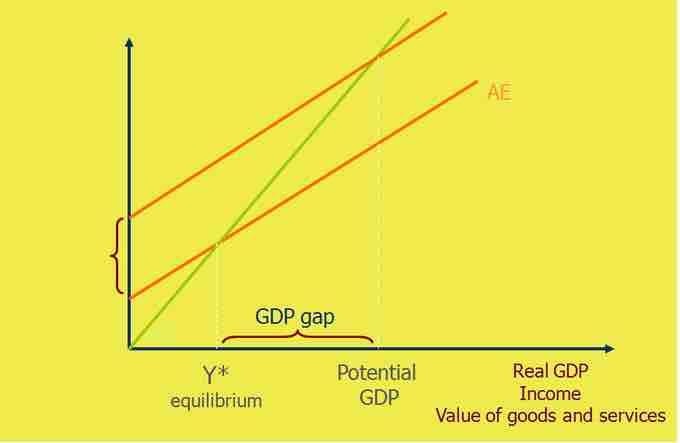Aggregate Expenditure
In economics, aggregate expenditure is the current value of all the finished goods and services in the economy. It is the sum of all the expenditures undertaken in the economy by the factors during a specific time period. The equation for aggregate expenditure is: AE = C + I + G + NX.
Written out the equation is: aggregate expenditure equals the sum of the household consumption (C), investments (I), government spending (G), and net exports (NX).
- Consumption (C): The household consumption over a period of time.
- Investment (I): The amount of expenditure towards the capital goods.
- Government expenditure (G): The amount of spending by federal, state, and local governments. Government expenditure can include infrastructure or transfers which increase the total expenditure in the economy.
- Net exports (NX): Total exports minus the total imports.
The aggregate expenditure determines the total amount that firms and households plan to spend on goods and services at each level of income.
Comparison to GDP
The aggregate expenditure is one of the methods that is used to calculate the total sum of all the economic activities in an economy, also known as the gross domestic product (GDP). The gross domestic product is important because it measures the growth of the economy. The GDP is calculated using the Aggregate Expenditures Model .

Aggregate Expenditure
This graph shows the aggregate expenditure model. It is used to determine and graph the real GPD, potential GDP, and point of equilibrium. A shift in supply or demand impacts the GDP.
An economy is at equilibrium when aggregate expenditure is equal to the aggregate supply (production) in the economy. The economy is not in a constant state of equilibrium. Instead, the aggregate expenditure and aggregate supply adjust each other toward equilibrium.
When there is excess supply over the expenditure, there is a reduction in either the prices or the quantity of the output which reduces the total output (GDP) of the economy.
In contrast, when there is an excess of expenditure over supply, there is excess demand which leads to an increase in prices or output (higher GDP). A rise in the aggregate expenditure pushes the economy towards a higher equilibrium and a higher potential of the GDP.